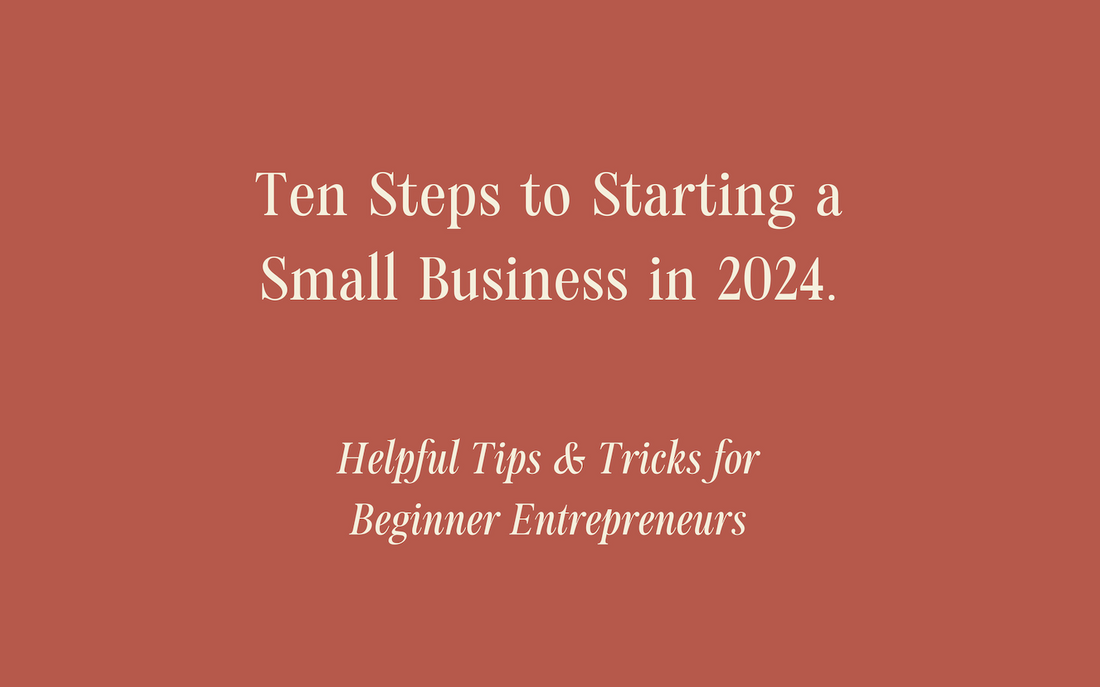Helpful Tips & Tricks for Beginner Entrepreneurs
Hi everyone! It’s Lauren here. Around this time last year I opened up my first business. Although I didn’t launch the store until the end of July, I had a lot of pre-work to do along the way. From setting up a company and website, to managing taxes and accounting, there was so much to learn.
I didn’t have any sort of “how to” guide that could have helped me figure it all out, which meant I wasted a lot of time and made some silly mistakes. So I thought I’d compile a list of ten steps to starting a small business, which can hopefully provide a bit of guidance if you are thinking of starting a business of your own.
Quick disclaimer: these steps won’t apply to every type of business. Some of these tips may be useful for you, some may not. Also, they are not meant to be followed in any particular order, but I tried to lay everything out in a way that follows the natural progression of forming a business, starting with the “Discovery” stage, then moving to the “Establishment” phase, and ending with “Execution”. Hope you enjoy!
Discovery
1. Research, Research, & More Research
Have an idea? Get ready to start researching, learning, and questioning that idea over and over again. Don’t rush this phase; you want to take time forming your idea and get really clear on what it is you want to offer your customer.
Questions to ask (in no particular order):
- Who is your target market? How much potential for growth is there in this market?
- What are your goals with your product or service? What are you offering? How can you differentiate yourself from your competitors?
- What are similar products or services that are currently on the market? Can these be improved?
- What does the structure of your business look like (will you need product materials, manufacturing, software, storage, employees)? Where will you get these? What will your costs look like?
Use the internet to connect with people. Reach out to potential suppliers and customers online - find out what problems exist within your target market - dig to find gaps and think about how your product or service can fill these gaps.
2. Pick A Niche
During my research phase, I listened to a lot of successful entrepreneurs talk about their start-up journeys. A common theme among them was that they were too broad in their brand offering at the beginning, which caused them to lack a clear focus and brand value proposition. Instead, these entrepreneurs all recommended starting with a strong, focused niche when establishing a business.
A strong niche means you are able to be very specific about what you’re offering, target a clear market, and have a distinguishable product/service (which will help with marketing). This also will give you room to focus on doing less, but doing it well. There’s always room to add more, but quality should never compromise. Starting a business can be overwhelming so having a clear niche and focus will help keep you on track!
3. Be Prepared To Pivot (A Lot)
I think I changed my idea of “Aware House” probably twenty-plus times before I settled on a more concrete idea for my store. Be prepared to pivot, a lot. This is what the discovery phase is all about: changing your mind, considering new ideas, and being open to suggestions or feedback. Not only should you have this attitude (especially) at the beginning of any business journey, but you should also carry this with you to remain receptive, innovative and flexible in your business. It’s all about seeing what works, what doesn’t, and constantly adjusting.
Establishment
4. Set Up A Company
Setting up a company offers you many benefits, from legal liability protection, to tax benefits, and credibility. It also makes it easy to keep all business matters expenses separate from all personal matters. Research what kind of company will best suit your business - there are a lot of Youtube videos that will guide you through the basic types of companies and explain which may be best for you.
If it’s within your budget, I highly recommend using a third-party service (or hiring someone personally) to help you set up your business, make sure you complete all required paperwork, and stay up to date on yearly compliance. I used Zen Business to set up my company and open a bank account. It’s super user friendly, facilitates all of the entity formation and state paperwork, and keeps me up to date on any document compliance and renewals.
5. Taxes & Accounting
You don’t want to mess with the IRS, and you don’t know what you don’t know. That’s why I highly recommend setting aside a budget for an accountant to help with bookkeeping, submitting tax forms, and staying compliant in your business.
You don’t need a full time accountant working for you, but it can be really helpful having a professional guide you through everything from start to finish. When you own a company and are selling a product or service, there are a lot more IRS forms and filings to deal with. I would highly recommend hiring a professional to help you at least once a quarter, or until you feel comfortable staying compliant by yourself.
6. Don’t Fall Behind
All these admin tasks are not the most glamorous (and definitely not the most fun), but they are very important. They are also very time consuming if you let yourself fall behind. This was a BIG mistake I made recently when it came to bookkeeping. I didn’t upload a single business receipt to my bookkeeping application and suddenly realized 8 months had passed and tax season was around the corner! Consequently, I had to spend hours going through all my old transactions and finding receipts for everything over $75. Needless to say I won’t make that mistake again and will be blocking monthly 2 hour sessions on my calendar to review all admin-related tasks.
7. Pick A Marketing Strategy
If you had all the time (and money) in the world, it would be pretty easy to do endless marketing for your business on Instagram, Tik Tok, Pinterest, Email, Google SEO, in-person markets, and so on. However, most of us have pretty limited resources. I recommend picking a marketing strategy that you can stick with and stay consistent. For me, that’s doing 20-25 posts on Instagram a month, 2-3 emails on the mailing list, and 1-2 written pieces a month (Blog Posts, Supplier Sunday’s).
Remember that your audience are real people, so engage with them as such. Marketing is not about getting sales, it’s about delivering your brand values and mission and engaging with your audience. I would much rather have 10 followers who strongly resonate with my brand and mission, than 100 followers who are not that interested.
Take the time to reflect on ways to connect with your audience - for example through educational content, blogs or vlogs, or creative videos or photoshoots. Marketing is about connections, and it’s an evergreen process. You should be reflecting constantly on what’s working and what isn’t, and have fun with it.
Execution
8. Time Management & Boundaries
I constantly feel like there aren’t enough hours in the day. Managing time and boundaries revolving around work is difficult, especially if you have a full time job on top of your side-business. I am a serial scheduler and I love to plan, so I make sure to plan afternoons or entire days where I do zero work. I do a lot of business marketing on Instagram, so it really helps that to turn off my Instagram notifications so I am not constantly bombarded with distracting pings.
I am also a big fan of straight-up leaving my phone at home on the weekends. Though this might not be practical for everyone, another good option is the “do not disturb” setting to prevent unwanted emails and notifications interrupting your downtime.
Schedule-in time for the things that you love and that keep you sane: working out, yoga, going for walks and runs outside, painting, reading, etc. It’s sticking to these small habits that will keep you from burning out in the long run!
9. Things Won't Go According To Plan
Be flexible and accept that things won’t go according to plan, and that’s perfectly fine. I’m a big believer that everything (good or bad) happens for a reason, not just in business, but in life.
When in doubt, ask for help from those around you. While yes, you have to trust your intuition and ultimately be the leader, it’s easy to get tunnel vision and forget about the bigger picture when you’re caught up in the day to day. I regularly ask those around me for feedback, especially when something unexpected happens and I get caught off-guard.
10. Enjoy It!
I know it’s hard to “trust the process” and not put yourself under constant pressure when you have time, money, and responsibilities on the line, but at the end of the day, try to let go and just have fun with it. Remember why you started your business in the first place, and seek the enjoyment that comes with it. It’s easy to dwell on the negative - try to appreciate small successes and highlight the positive instead.
Think about your “worst case” scenario if your business doesn’t succeed in the long term - it would be disappointing, but life goes on. At the end of the day if you “fail”, there’ll be a lot you can take away from the experience. Whether that’s the skills or knowledge you acquired, or people you met along the way, these will continue to serve you in the next chapter of your life.


